- Biomechanics and Integrative Movement Laboratory
Faculty, undergraduate and graduate students research a variety of biomechanical topics of interest in this lab. They study the forces that act upon the body, the resulting movements based upon the forces, the muscle activation patterns that respond to the task, environmental factors that contribute to the movement and much more.
Capabilities of the Lab:
- Three-dimensional motion analysis
- Six degrees of freedom assessment of forces
- Indirect measures of muscle force
- Assessment of muscle activation patterns
Equipment:
- Qualisys Motional Capture System with six Oqus 100 cameras
- AMTI "six degrees of freedom" (6-DOF) force platform
- Motion Labs Systems 16-channel electromyography system
- Biodex System 3 isokinetic dynamometer
- Kistler three-dimensional accelerometer
- Polhemus electromagnetic tracking system
- Treadmill
- Exercise Physiology Laboratory
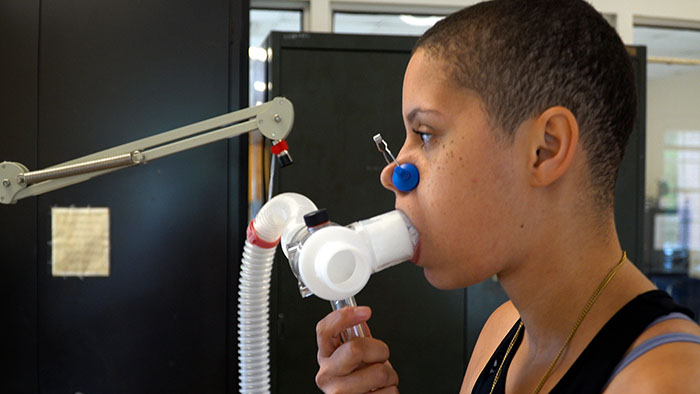 Capabilities of the Lab:
Capabilities of the Lab:
- Wingate test for anaerobic power
- Underwater weighing
- Resistance exercsie
- VO2 max
- Twelve-lead ECG
- Bloog chemistry analysis
- Treadmill, cycle, and arm ergometry
- Cardiovascular Control Laboratory
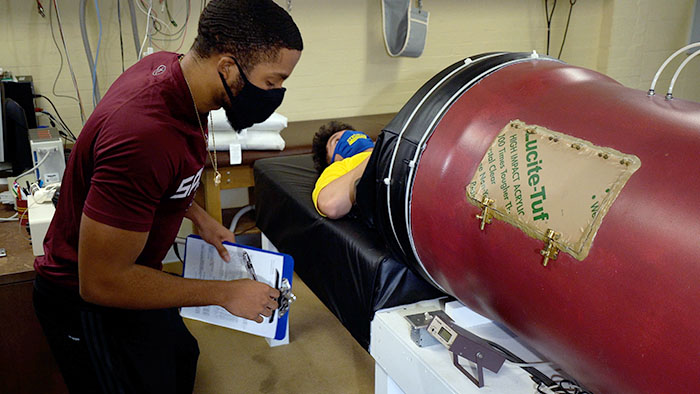 The Cardiovascular Control Lab specializes in integrative human cardiovascular physiology. Current research projects focus on underlying mechanisms of how specific conditions or interventions affect blood pressure across the lifespan. These include chronic diseases, sex and aging, menopause, and remote ischemic preconditioning. Various approaches to measure hemodynamic, vascular, and autonomic function are utilized in most projects.
The Cardiovascular Control Lab specializes in integrative human cardiovascular physiology. Current research projects focus on underlying mechanisms of how specific conditions or interventions affect blood pressure across the lifespan. These include chronic diseases, sex and aging, menopause, and remote ischemic preconditioning. Various approaches to measure hemodynamic, vascular, and autonomic function are utilized in most projects.
Location: Davies 206
Lab Director: Juliane Wallace, PhD, FACSM
- Social Psychology of Sport Laboratory
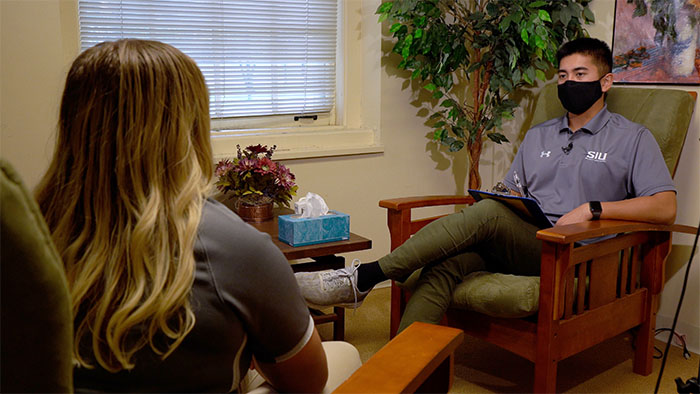 In the Social Psychology of Sport Lab, students have the opportunity to study the psychological side of sport, as well as the motivational skills necessary for consistent exercise. In addition to those areas, the impact of social influence (i.e. peers, parents, coaches, siblings) on psychosocial outcomes in sport and physical activity, as well as the effects of shame and embarrassment on sport and physical activity performance are investigated.
In the Social Psychology of Sport Lab, students have the opportunity to study the psychological side of sport, as well as the motivational skills necessary for consistent exercise. In addition to those areas, the impact of social influence (i.e. peers, parents, coaches, siblings) on psychosocial outcomes in sport and physical activity, as well as the effects of shame and embarrassment on sport and physical activity performance are investigated.
- Julie A. Honerkamp Strong Survivors Cancer Rehabilitation Laboratory (JAHSSCRL)
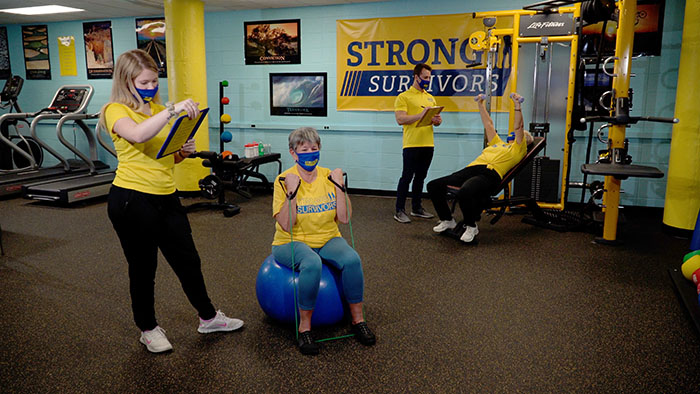 In the JAHSSCRL, Saluki students use exercise as a therapeutic tool to help cancer survivors and caregivers from the southern Illinois community maintain and enhance their quality of life during the treatment and recovery period. Students get valuable hands-on experience and develop their professional skills while working with this challenging population. They also enhance their resumes with an experience that is truly unique and helps them stand out above the crowded field of job and graduate school program applicants. Above all, students gain have a personal experience that is beyond rewarding.
In the JAHSSCRL, Saluki students use exercise as a therapeutic tool to help cancer survivors and caregivers from the southern Illinois community maintain and enhance their quality of life during the treatment and recovery period. Students get valuable hands-on experience and develop their professional skills while working with this challenging population. They also enhance their resumes with an experience that is truly unique and helps them stand out above the crowded field of job and graduate school program applicants. Above all, students gain have a personal experience that is beyond rewarding.
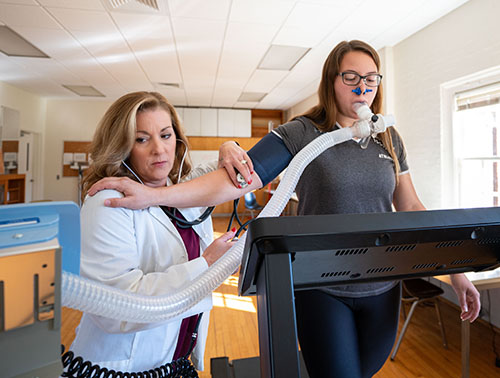 Our Exercise Science laboratories provide students with the opportunity to take what they are learning in the classroom and apply that knowledge in a practical, hands-on setting. These experiences allow each student the opportunity to contribute to important discoveries in their fields of interest, hone their professional skills, and bolster their resumes. These experiences help to set our students apart from other contenders in employment search situations, as well as when they are applying for slots in graduate or professional school programs.
Our Exercise Science laboratories provide students with the opportunity to take what they are learning in the classroom and apply that knowledge in a practical, hands-on setting. These experiences allow each student the opportunity to contribute to important discoveries in their fields of interest, hone their professional skills, and bolster their resumes. These experiences help to set our students apart from other contenders in employment search situations, as well as when they are applying for slots in graduate or professional school programs.




 Capabilities of the Lab:
Capabilities of the Lab: The Cardiovascular Control Lab specializes in integrative human cardiovascular physiology. Current research projects focus on underlying mechanisms of how specific conditions or interventions affect blood pressure across the lifespan. These include chronic diseases, sex and aging, menopause, and remote ischemic preconditioning. Various approaches to measure hemodynamic, vascular, and autonomic function are utilized in most projects.
The Cardiovascular Control Lab specializes in integrative human cardiovascular physiology. Current research projects focus on underlying mechanisms of how specific conditions or interventions affect blood pressure across the lifespan. These include chronic diseases, sex and aging, menopause, and remote ischemic preconditioning. Various approaches to measure hemodynamic, vascular, and autonomic function are utilized in most projects. In the Social Psychology of Sport Lab, students have the opportunity to study the psychological side of sport, as well as the motivational skills necessary for consistent exercise. In addition to those areas, the impact of social influence (i.e. peers, parents, coaches, siblings) on psychosocial outcomes in sport and physical activity, as well as the effects of shame and embarrassment on sport and physical activity performance are investigated.
In the Social Psychology of Sport Lab, students have the opportunity to study the psychological side of sport, as well as the motivational skills necessary for consistent exercise. In addition to those areas, the impact of social influence (i.e. peers, parents, coaches, siblings) on psychosocial outcomes in sport and physical activity, as well as the effects of shame and embarrassment on sport and physical activity performance are investigated. In the JAHSSCRL, Saluki students use exercise as a therapeutic tool to help cancer survivors and caregivers from the southern Illinois community maintain and enhance their quality of life during the treatment and recovery period. Students get valuable hands-on experience and develop their professional skills while working with this challenging population. They also enhance their resumes with an experience that is truly unique and helps them stand out above the crowded field of job and graduate school program applicants. Above all, students gain have a personal experience that is beyond rewarding.
In the JAHSSCRL, Saluki students use exercise as a therapeutic tool to help cancer survivors and caregivers from the southern Illinois community maintain and enhance their quality of life during the treatment and recovery period. Students get valuable hands-on experience and develop their professional skills while working with this challenging population. They also enhance their resumes with an experience that is truly unique and helps them stand out above the crowded field of job and graduate school program applicants. Above all, students gain have a personal experience that is beyond rewarding.